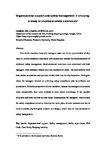Organisational support and safety management in shipping: A Study of shipboard safety supervision
| dc.contributor.author | Xue, C | |
| dc.contributor.author | Tang, Lijun | |
| dc.date.accessioned | 2019-07-04T14:50:12Z | |
| dc.date.issued | 2019-08-18 | |
| dc.identifier.issn | 1035-3046 | |
| dc.identifier.issn | 1838-2673 | |
| dc.identifier.uri | http://hdl.handle.net/10026.1/14601 | |
| dc.description.abstract |
<jats:title>Abstract</jats:title><jats:p>Shipping is a safety critical industry where operational errors may lead to maritime accidents involving property damage, loss of lives and environmental pollution. As part of the trend towards self-regulation, the International Maritime Organisation has adopted a worldwide International Safety Management Code which made ship managers responsible for workplace health and safety. This study, based on interviews in two Chinese shipping companies, examines how ship managers use ship visits to monitor shipboard safety management. Interviews with managers from company offices and crew members indicated that managerial ship visits mainly take the form of inspections that focus on low-trust surveillance and disciplinary action rather than genuine support, being based on the safe person rather than the more effective safe place approach. From the perspective of crew members, because the managers visited ships only occasionally, they were unlikely to have sound knowledge of the specific situations and work routines on their ships. Consequently, managers’ interventions for safety compliance were seen by crew members as failing to address real risk factors, and leading instead to increased workloads, psychological pressure and fatigue, the very antithesis of safety management. Meanwhile a coherent, supportive system for reducing risk remains underdeveloped in the shipping industry.</jats:p> | |
| dc.format.extent | 549-565 | |
| dc.language | en | |
| dc.language.iso | en | |
| dc.publisher | SAGE Publications | |
| dc.subject | 14 Life Below Water | |
| dc.title | Organisational support and safety management in shipping: A Study of shipboard safety supervision | |
| dc.type | journal-article | |
| dc.type | Journal Article | |
| plymouth.issue | 4 | |
| plymouth.volume | 30 | |
| plymouth.publication-status | Published | |
| plymouth.journal | The Economic and Labour Relations Review | |
| dc.identifier.doi | 10.1177/1035304619869575 | |
| plymouth.organisational-group | /Plymouth | |
| plymouth.organisational-group | /Plymouth/Faculty of Arts, Humanities and Business | |
| plymouth.organisational-group | /Plymouth/Faculty of Arts, Humanities and Business/Plymouth Business School | |
| plymouth.organisational-group | /Plymouth/REF 2021 Researchers by UoA | |
| plymouth.organisational-group | /Plymouth/REF 2021 Researchers by UoA/UoA17 Business and Management Studies | |
| plymouth.organisational-group | /Plymouth/Users by role | |
| plymouth.organisational-group | /Plymouth/Users by role/Academics | |
| dcterms.dateAccepted | 2019-06-22 | |
| dc.rights.embargodate | 2019-9-13 | |
| dc.identifier.eissn | 1838-2673 | |
| dc.rights.embargoperiod | Not known | |
| rioxxterms.versionofrecord | 10.1177/1035304619869575 | |
| rioxxterms.licenseref.uri | http://www.rioxx.net/licenses/all-rights-reserved | |
| rioxxterms.licenseref.startdate | 2019-08-18 | |
| rioxxterms.type | Journal Article/Review |


